CCR Medical Administers Over 50 Prescription Drugs
We administer most IV drugs as well as a wide range of injections. If you don’t see your prescription, call us!
Actemra (tocilizumab)

Actemra (tocilizumab) is used to treat moderate-to-severe rheumatoid arthritis (RA) and juvenile idiopathic arthritis (JIA). It is also used to treat giant cell arteritis, systemic sclerosis-associated interstitial lung disease, and cytokine release syndrome.
WHAT TO EXPECT
Actemra is usually administered once every 4 weeks for RA, more frequently for other diagnoses. Most Actemra infusions are intravenous, although sometimes Actemra is injected subcutaneously. Each intravenous infusion takes about an hour.
| Actemra Website |
| Prescribing Information |
| Patient Support |
Adakveo (crizanlizumab-tmca)

Adakveo (crizanlizumab-tmca) is used in people with sickle cell disease to help reduce how often pain crises, also known as "vaso-occlusive crises," happen.
Vaso-occlusive crises (VOCs) occur when micro circulation is obstructed by "sickled" red blood cells. Adakveo works by binding to P-selectin, a protein that plays a central role in cellular interactions that can lead to vaso-occlusion. In its initial study, Adakveo was shown to reduce VOCs (vaso-occlusive crisis0) by about 45%.
WHAT TO EXPECT
Adakveo is given every 4 weeks after two starter doses. Each intravenous infusion takes about 30 minutes.
| Website |
| Prescribing Information |
| Patient Support |
Aralast NP (alpha 1-antitrypsin inhibitor)

Aralast NP (alpha 1-antitrypsin inhibitor) is a peptide isolated and purified from donor plasma. It is used to treat adults with lung disease (emphysema) caused by severe Alpha1 Antitrypsin (AAT) deficiency.
The Alpha1 protein circulates in the bloodstream and works to protect the lungs from inflammation due to infection or inhaled irritants, such as tobacco smoke. Alpha1 deficiency is an inherited disorder in which a genetic mutation impacts the body’s ability to produce sufficient levels of the Alpha1 protein.
Glassia, Prolastin-C, and Zemaira are related medicines with minor chemical differences associated with the purification method.
WHAT TO EXPECT
Aralast NP is given weekly by intravenous infusion. Each infusion takes 15 to 30 minutes.
| Website |
| Prescribing Information |
| Patient Support |
Avsola (infliximab-axxq)

Avsola (infliximab-axxq) is used to treat certain types of arthritis (Rheumatoid Arthritis (RA) and psoriatic arthritis), certain bowel diseases (Crohn's disease and Ulcerative Colitis (UC)), as well as plaque psoriasis and ankylosing spondylitis (an inflammatory disease that, over time, can cause some of the bones in the spine to fuse).
In these inflammatory conditions, your immune system becomes overactive and produces excess amounts of a protein called TNF-alpha (tumor necrosis factor alpha), which causes your immune system to attack healthy cells. Avsola blocks the action of TNF-alpha, preventing inflammation.
Avsola is biosimilar to Remicade (Jannsen), the original formulation of infliximab. Other Remicade biosimilars include Inflectra (Pfizer) and Renflexis (Merck).
WHAT TO EXPECT
Avsola is administered by intravenous infusion every eight weeks (every 6 weeks for ankylosing spondylitis) after an induction regimen that includes three doses over six weeks. Each infusion takes about two hours.
Your doctor may prescribe premedication with antihistamine, acetaminophen, and/or corticosteroid along with your Avsola infusion.
| Website |
| Prescribing Information |
| Patient Support |
Benlysta (belimumab)

Benlysta (belimumab) is used to treat active systemic lupus erythematosus (SLE or lupus) or active lupus nephritis (lupus-related kidney inflammation) in people who are receiving other lupus medicines.
In lupus, the immune system produces harmful antibodies that attack the body's own tissues. Benlysta targets a type of white blood cell, called B-cells, that produce these antibodies. Benlysta works by binding to the protein BLyS that is necessary for B-cells to grow.
WHAT TO EXPECT
Benlysta is usually administered once every 4 weeks as a one-hour infusion, though it can also be given subcutaneously, in the abdomen or thigh. Subcutaneous injections are generally given once a week.
| Website |
| Prescribing Information |
| Patient Support |
Bivigam

Bivigam is an immune globulin made from human blood plasma. Intravenous immune globulin (IVIG) contains antibodies that help protect against various diseases.
Bivigam is used in the treatment of primary humoral immunodeficiency (PI). This includes humoral immune defects in common variable immunodeficiency (CVID), X-linked agammaglobulinemia, and congenital agammaglobulinemia, Wiskott-Aldrich syndrome, and severe combined immunodeficiencies (SCID).
WHAT TO EXPECT
Bivigam is given by IV infusion or subcutaneous (under the skin) every 3-4 weeks. Dosing is calculated based on your weight so infusion time will vary per individual.
| Website |
| Prescribing Information |
| Patient Support |
Cerezyme (imiglucerase)
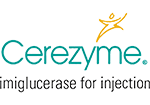
Cerezyme (imiglucerase) is a specific enzyme for long-term enzyme replacement for patients with Type 1 Gaucher disease a rare inherited disorder in which the enzyme glucocerebrosidase builds up in the body resulting in anemia, tiredness, easy bruising, and a tendency to bleed among other symptoms.
WHAT TO EXPECT
Cerezyme is given via IV infusion in a range of 3 times per week to once every 2 weeks depending on severity of your illness. Each infusion will take 1-2 hours.
| Website |
| Prescribing Information |
| Patient Support |
Cimzia (certolizumab pegol)

Cimzia (certolizumab pegol) is a monoclonal antibody that helps the body's immune system by targeting and destroying certain cells helping to protect healthy cells from damage. Specifically, it is a tumor necrosis factor blocker (TNF) for treatment of Crohn’s Disease Rheumatoid Arthritis (RA) Psoriatic Arthritis Ankylosing Spondylitis Non-radiographic Axial Spondylarthritis.
WHAT TO EXPECT
Cimzia is given as 2 subcutaneous injections (under the skin) with 3 starter doses given in one month and then maintenance doses every 2-4 weeks.
| Website |
| Prescribing Information |
| Patient Support |
Cinqair (reslizumab)

Cinqair (reslizumab) is a monoclonal antibody that helps the body's immune system by reducing the level of a certain type of white blood cells. Specifically it is an interleukin- 5 (IL-5) antagonist monoclonal antibody for add-on maintenance treatment of patients with severe asthma aged 18 years and older and with an eosinophilic phenotype.
WHAT TO EXPECT
CINQAIR is given by IV infusion every 4 weeks. Each infusion will take 20minutes to 1 hour.
| Website |
| Prescribing Information |
| Patient Support |
Cosentyx (secukinumab)

Cosentyx (secukinumab) is an immunosuppressant that reduces the effects of a chemical substance in the body that can cause inflammation. Specifically it is a human interleukin-17A antagonist for treatment of moderate to severe plaque psoriasis (for patients eligible for phototherapy and systemic therapy) adult active psoriatic arthritis adult active ankylosing spondylitis.
WHAT TO EXPECT
Consentyx is given as a subcutaneous injection (under the skin) once a week for 4 weeks and then monthly.
| Website |
| Prescribing Information |
| Patient Support |
Cubicin (daptomycin)

Cubicin (daptomycin) is an antibiotic indicated for the treatment of complicated skin and soft tissue infections against certain gram-positive bacteria.
WHAT TO EXPECT
Cubicin is given by IV infusion daily over 30 minutes.
| Website |
| Prescribing Information |
| Patient Support |
Cuvitru (Human Immune Globulin Subcutaneous 20% solution)

Cuvitru (Human Immune Globulin Subcutaneous 20% solution) is an immune globulin made from human blood plasma. Intravenous immune globulin (IVIG) contains antibodies that help protect against various diseases. It is used as replacement therapy for primary humoral immunodeficiency (PI) in adult and pediatric patients two years and older.
WHAT TO EXPECT
Cuvitru is administered subcutaneously (under the skin) at regular intervals from daily up to every 3 weeks based on the individuals clinical response.
| Website |
| Prescribing Information |
| Patient Support |
Dalvance (dalbavancin)

Dalvance (dalbavancin) is an antibiotic used for the treatment of acute bacterial skin and soft-tissue infections caused by certain gram-positive bacteria.
WHAT TO EXPECT
Dalvance is given via IV infusion, 2 doses one week apart. Each infusion takes 30+ minutes.
| Website |
| Prescribing Information |
Dupixent

Dupixent is a monoclonal antibody that helps the body's immune system by targeting and destroying certain cells. This may help to protect healthy cells from damage. Specifically, it is an interleukin-4 receptor alpha antagonist. It is used to treat asthma, atopic dermatitis and chronic sinusitis.
WHAT TO EXPECT
Dupixent is given by subcutaneous (under the skin) injection every 2 weeks after an initial loading dose.
| Website |
| Prescribing Information |
| Patient Support |
Elelyso (taliglucerase alfa)

Elelyso (taliglucerase alfa) is a specific enzyme for long-term enzyme replacement for patients with Type 1 Gaucher disease a rare inherited disorder in which the enzyme glucocerebrosidase builds up in the body resulting in anemia, tiredness, easy bruising, and a tendency to bleed among other symptoms.
WHAT TO EXPECT
Elelyso is given by IV infusion every other week, over 1-2 hours.
| Website |
| Prescribing Information |
Enbrel (etanercept)

Enbrel (etanercept) is a monoclonal antibody that helps the body's immune system by targeting and destroying certain cells. This may help to protect healthy cells from damage. Specifically it is a tumor necrosis factor (TNF) blocker that is useful in treating a wide range of inflammatory disorders.
WHAT TO EXPECT
Enbrel is given subcutaneously (under the skin) once weekly (more frequently for psoriasis).
| Website |
| Prescribing Information |
Entyvio (vedolizumab)

Entyvio (vedolizumab) is used to treat moderate to severe ulcerative colitis (UC) and moderate to severe Crohn's Disease. Entyvio treats active disease and may help keep UC or Crohn's symptoms under control, long term. It may also reduce the need for steroid medicines in long term treatment. Entyvio is usually given after other treatments have failed.
Entyvio works by preventing an excess of white blood cells from entering into the GI tract. This helps to control inflammation and symptoms of ulcerative colitis and Crohn's disease.
WHAT TO EXPECT
Entyvio is administered by intravenous infusion every eight weeks, after two starter doses in the first six weeks. Each infusion takes about 30 minutes.
| Website |
| Prescribing Information |
| Patient Support |
Evenity (romosozumab-aqqg)

Evenity (romosozumab-aqqg) is for women with osteoporosis (a progressive bone loss disease) after menopause at high risk for fracture. Evenity works with your body’s natural ability to build new bone and slow down bone loss.
WHAT TO EXPECT
Evenity is given as 2 subcutaneous (under the skin) injections monthly.
| Website |
| Prescribing Information |
| Patient Support |
Fasenra (benralizumab)

Fasenra (benralizumab) is a monoclonal antibody that helps the body's immune system by reducing the level of a certain type of white blood cells helping to protect healthy cells from damage. Specifically, it is an interleukin-5 receptor alpha-directed cytolytic monoclonal antibody (IgG1 kappa) used as an add-on maintenance treatment for patients with severe asthma aged 12 years and older with an eosinophilic phenotype.
WHAT TO EXPECT
Fasenra is given as a subcutaneous injection every 4 weeks for 3 doses and then every 8 weeks. Each injection takes about 15 minutes plus a 30-minute observation.
| Website |
| Prescribing Information |
| Patient Support |
Feraheme (ferumoxytol)

Feraheme (ferumoxytol) is a polyglucose sorbitol carboxymethylether coated iron complex used for treatment of iron deficiency anemia in adult patients who have oral iron intolerance or chronic kidney disease.
WHAT TO EXPECT
Feraheme is given by IV infusion in 2 doses, 8 days apart. The length of infusion is 15+ minutes.
| Website |
| Prescribing Information |
| Patient Support |
Gammagard Liquid

Gammagard Liquid is an immune globulin (IG) made from human blood plasma. Like other IG products Gammagard contains antibodies. Specifically, it is an immune globulin (Intravenous gamma globulin Human 10%) for replacement therapy for primary humoral immunodeficiency (PI) in adults and pediatric patients 2 years and older and for Maintenance therapy to improve muscle strength and disability in adult patients with multifocal motor neuropathy.
WHAT TO EXPECT
Gammagard is given by IV infusion with a variable frequency. Each infusion lasts one hour to several hours depending on the dose.
| Website |
| Prescribing Information |
| Patient Support |
Gammaked

Gammaked is an immune globulin (IG) made from human blood plasma. Like other IG products Gammaked contains antibodies. Specifically, it is an immune globulin (human 10%) for treatment of: primary humoral immunodeficiency (PI) in patients 2 years and older Idiopathic Thrombocytopenic Purpura (ITP) and Chronic Inflammatory Demyelinating Polyneuropathy (CIDP).
WHAT TO EXPECT
Frequency of infusion varies and length of infusion is one hour or several hours depending on dose.
| Website |
| Prescribing Information |
Gamunex-C

Gamunex-C is an immune globulin (IG) made from human blood plasma. Like other IG products Gamunex-C contains antibodies. Specifically, it is an immune globulin (human 10% caprylate/chromatography purified) for the treatment of primary humoral immunodeficiency (PI) in patients 2 years and older Idiopathic Thrombocytopenic Purpura (ITP) Chronic Inflammatory Demyelinating Polyneuropathy (CIDP).
WHAT TO EXPECT
Infusion frequency varies and length of infusion is one hour to several hours depending on dose.
| Website |
| Prescribing Information |
| Patient Support |
Glassia (alpha 1-antitrypsin inhibitor)

Glassia (alpha 1-antitrypsin inhibitor) is a peptide isolated from donor plasma and purified. It is used to treat adults with lung disease (emphysema) caused by severe Alpha1 Antitrypsin (AAT) deficiency.
The Alpha1 protein circulates in the bloodstream and works to protect the lungs from inflammation due to infection or inhaled irritants, such as tobacco smoke. Alpha1 deficiency is an inherited disorder in which a genetic mutation impacts the body’s ability to produce sufficient levels of the Alpha1 protein.
Aralast NP, Prolastin-C, and Zemaira are related medicines with minor chemical differences associated with the purification method.
WHAT TO EXPECT
Glassia is given weekly by intravenous infusion. Each infusion takes 15 to 30 minutes.
| Website |
| Prescribing Information |
Hemlibra (emicizumab-kxwh)

Hemlibra (emicizumab-kxwh) is a monoclonal antibody that works in place of a natural blood-clotting factor. Hemlibra is prescribed to prevent or reduce the frequency of bleeding episodes in adults and children newborn with Hemophilia A with or without factor VIII inhibitors.
WHAT TO EXPECT
Hemlibra is given as a subcutaneous injection once a week for the first 4 weeks and then every 1, 2, or 4 weeks depending on your prescription. Each infusion will take 10-30 minutes.
| Website |
| Prescribing Information |
| Patient Support |
Hizentra

Hizentra is an Immune Globulin (IG) made from human blood plasma. Like other IG products Hizentra contains antibodies. Hizentra is used primarily to treat Chronic Inflammatory Demyelinating Polyneuropathy (CIDP).
WHAT TO EXPECT
Hizentra is given by subcutaneous injection that varies from more than once a week to eve3ry 2 weeks. Each injection appointment will take about 1 hour.
| Website |
| Prescribing Information |
| Patient Support |
Humira (adalimumab)

Humira (adalimumab) is a monoclonal antibody that helps the body's immune system by targeting and destroying certain cells. This may help to protect healthy cells from damage. Specifically it is a tumor necrosis factor (TNF) blocker that is useful in treating a wide range of inflammatory disorders including RA, JIA, PsA, AS, Crohn’s, UC, PS, HS, and UV.
WHAT TO EXPECT
Humira is given as a subcutaneous injection every 2 weeks and length of treatment depends on the condition being treated.
| Website |
| Prescribing Information |
Ilaris (canakinumab)
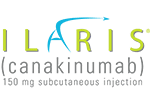
Ilaris (canakinumab) is used to treat certain types of periodic fever syndromes, sometimes called auto-inflammatory syndromes. (Periodic fever syndromes are rare and often inherited conditions caused by mutations in certain genes.)
Ilaris is a monoclonal antibody that works by blocking a natural protein (interleukin-1 beta) to lessen symptoms such as rash, joint/muscle pain, fever, eye redness, and tiredness.
Ilaris is also used to treat specific forms of arthritis, including Still's Disease (a rare type of inflammatory arthritis that features fevers, rash and joint pain) and Systemic Juvenile Idiopathic Arthritis.
WHAT TO EXPECT
Ilaris is given by subcutaneous injection once every 4-8 weeks.
| Website |
| Prescribing Information |
| Patient Support |
Ilumya (tildrakizumab-asmn)

Ilumya (tildrakizumab-asmn) is a monoclonal antibody that helps the body's immune system by targeting and destroying certain cells helping to protect healthy cells from damage. Specifically it is an interleukin-23 antagonist for the treatment of adults with moderate to severe plaque psoriasis.
WHAT TO EXPECT
Ilumya is given as a subcutaneous injection of 4 doses a year after 2 initial doses. Each injection appointment will take about 15 minutes.
| Website |
| Prescribing Information |
| Patient Support |
Inflectra (infliximab-dyyb)

Inflectra (infliximab-dyyb) is used to treat certain types of arthritis (Rheumatoid Arthritis (RA) and psoriatic arthritis), certain bowel diseases (Crohn's disease and Ulcerative Colitis (UC)), as well as plaque psoriasis and ankylosing spondylitis (an inflammatory disease that, over time, can cause some of the bones in the spine to fuse).
In these inflammatory conditions, your immune system becomes overactive and produces excess amounts of a protein called TNF-alpha (tumor necrosis factor alpha), which causes your immune system to attack healthy cells. Inflectra blocks the action of TNF-alpha, preventing inflammation.
Inflectra is biosimilar to Remicade (Jannsen), the orginal forumlation of infliximab. Other Remicade biosimilars include Avsola (Amgen) and Renflexis (Merck).
WHAT TO EXPECT
Inflectra is administered by intravenous infusion every eight weeks (every 6 weeks for ankylosing spondylitis) after an induction regimen that includes three doses over six weeks. Each infusion takes about two hours.
Your doctor may prescribe premedication with antihistamine, acetaminophen, and/or corticosteroid along with your Inflectra infusion.
| Website |
| Prescribing Information |
| Patient Support |
Injectafer (ferric carboxymaltose)

Injectafer (ferric carboxymaltose) is an iron replacement product for the treatment of iron deficiency in adults.
WHAT TO EXPECT
Injectafer is given via IV infusion with 2 doses at least 7 days apart. Each infusion will take at least one hour.
| Website |
| Prescribing Information |
| Patient Support |
Invanz (ertapenem)

Invanz (ertapenem) for injection is an antibiotic used in infections skin lungs stomach pelvis and urinary tract caused by certain bacteria.
WHAT TO EXPECT
Invanz is given as an IV infusion daily, for 2-4 weeks. Each infusion will last 30 or more minutes.
Krystexxa (pegloticase)

Krystexxa (pegloticase) is a recombinant porcine-like uricase used to treat chronic gout. Gout is a kind of arthritis caused when there is too much uric acid in the body. Krystexxa metabolizes (converts) uric acid to a water-soluble compound called allantoin, which your body can eliminate easily. Krystexxa can lower uric acid levels very quickly, and dissolve gout build-up over time.
WHAT TO EXPECT
Krystexxa is given by IV infusion every 2 weeks for as long as your physician recommends. Each infusion will take at least 3 hours.
| Website |
| Prescribing Information |
Lemtrada (alemtuzumab)

Lemtrada (alemtuzumab) is a monoclonal antibody that helps the body's immune system by targeting and destroying certain cells helping to protect healthy cells from damage. Specifically, it is a CD52-directed cytolytic monoclonal antibody for the treatment of Multiple Sclerosis (MS). While Lemtrada does not cure MS it may help make relapses less frequent.
WHAT TO EXPECT
Lemtrada is given by IV infusion daily for 5 days and then once a year. Each infusion will take 5 hours.
| Website |
| Prescribing Information |
| Patient Support |
Leqembi (alemtuzumab)
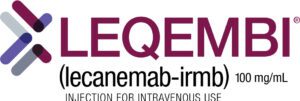
LEQEMBI is a prescription medicine used to treat people with Alzheimer’s disease. Do not
receive LEQEMBI if you have serious allergic reactions to lecanemab-irmb or to any of the
ingredients in LEQEMBI.
WHAT TO EXPECT
LEQEMBI is an intravenous (IV) infusion. Each LEQEMBI infusion takes about 1 hour. You
may be at the infusion center for longer than that, especially for your first infusion, so set aside
extra time so you don't feel rushed. LEQEMBI infusions are given once every 2 weeks.
| Website |
| Prescribing Information |
| Patient Support |
Lumizyme (alglucosidase alfa)

Lumizyme (alglucosidase alfa) is an enzyme replacement therapy produced by recombinant DNA technology. It provides a source of alpha-glucosidase, an essential enzyme that is deficient or absent in patients with Pompe disease.
WHAT TO EXPECT
Lumizyme is given by IV infusion every 2 weeks. Each infusion will take 4 hours.
| Website |
| Prescribing Information |
| Patient Support |
Mycamine (micafungin)

Mycamine (micafungin) is an echinocandin (a new class of antifungal drugs that target and destroy the cell wall of fungi) used to treat certain fungal infections caused by some yeasts and some molds.
WHAT TO EXPECT
Mycamine is given by IV infusion daily for 2-4 weeks. Each infusion will take 1 hour.
| Prescribing Information |
Nucala (mepolizumab)
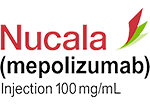
Nucala (mepolizumab) is a monoclonal antibody that helps the body's immune system by reducing the level of a certain type of white blood cells. Specifically, it is an interleukin-5 (IL-5) antagonist monoclonal antibody (IgG1 kappa) for patients with severe eosinophilic asthma and patients with eosinophilic granulomatosis polyangiitis (EGPA).
WHAT TO EXPECT
Nucala is given by subcutaneous (under the skin) injection monthly. Each injection appointment will take about 10 minutes.
| Website |
| Prescribing Information |
| Patient Support |
Nulojix (belatacept)

Nulojix (belatacept) is a selective T cell co-stimulation blocker. It is used with other drugs to prevent kidney transplant rejection. Nulojix works by weakening the body’s immune system to help prevent rejection.
WHAT TO EXPECT
Nulojix is given by IV infusion every 4 weeks after 4 weekly starting doses. Each infusion will take about 30 minutes.
| Website |
| Prescribing Information |
| Patient Support |
Ocrevus (ocrelizumab)

Ocrevus (ocrelizumab) is used to treat relapsing or primary progressive forms of multiple sclerosis (MS).
Ocrevus is a monoclonal antibody that targets CD20 positive B lymphocytes (a type of white blood cell), which contribute to nerve damage in MS. This may help to protect healthy cells from damage.
WHAT TO EXPECT
Ocrevus is usually administered by intravenous infusion every six months, after a starter dose that is split into two separate infusions, two weeks apart. Each infusion takes from 2-1/2 to 4 hours.
Patients are routinely given other medications at the same time to help prevent certain side effects of the drug.
| Website |
| Prescribing Information |
| Patient Support |
Orencia (abatacept)

Orencia (abatacept) is a synthetic (man-made) protein produced by recombinant DNA technology that is used for treating rheumatoid arthritis. It is an immunosuppressant that works by blocking the activity of T-cells, a type of immune cell in the body that causes swelling and joint damage in people who have arthritis.
WHAT TO EXPECT
Orencia is given by IV infusion 3 times in the first month, and then every 4 weeks. Each infusion will take about 30 minutes.
| Website |
| Prescribing Information |
| Patient Support |
Privigen

Privigen is an immune globulin used made from human blood plasma. Intravenous immune globulin (IVIG) contains antibodies that help protect against various diseases. Privigen is used in the treatment of Primary Immune Deficiency, Chronic Inflammatory Demyelinating Polyneuropathy, and Immune Thrombolytic Purpure.
WHAT TO EXPECT
Privigen is given by IV infusion. Frequency and duration of infusion will depend on the condition being treated.
| Website |
| Prescribing Information |
Prolastin C (alpha 1-antitrypsin inhibitor)

Prolastin C (alpha 1-antitrypsin inhibitor) is a peptide isolated from donor plasma and purified. It is used to treat adults with lung disease (emphysema) caused by severe Alpha1 Antitrypsin (AAT) deficiency.
The Alpha1 protein circulates in the bloodstream and works to protect the lungs from inflammation due to infection or inhaled irritants, such as tobacco smoke. Alpha1 deficiency is an inherited disorder in which a genetic mutation impacts the body’s ability to produce sufficient levels of the Alpha1 protein.
Aralast NP, Glassia, and Zemaira are related medicines with minor chemical differences associated with the purification method.
WHAT TO EXPECT
Prolastin C is given weekly by intravenous infusion. Each infusion takes 15 to 30 minutes.
| Website |
| Prescribing Information |
Prolia (denosumab)

Prolia (denosumab) is a monoclonal antibody that helps the body's immune system by targeting and destroying certain cells, helping to protect healthy cells from damage. Specifically, it is a RANK (receptor activator of nuclear activator kappa) inhibitor used to treat osteoporosis.
WHAT TO EXPECT
Prolia is given by subcutaneous (under the skin) injection once every 6 months. Each appointment will take about 10 minutes.
| Website |
| Prescribing Information |
| Patient Support |
Radicava (edaravone)

Radicava (edaravone) is used to treat Amyotrophic Lateral Sclerosis (ALS). Radicava works by keeping certain nerve cells called motor neurons healthy in order to preserve muscle function.
WHAT TO EXPECT
Radicava is given by IV infusion, 14 days on and 14 days off. Each infusion will take about 1 hour.
| Website |
| Prescribing Information |
| Patient Support |
Reclast (zoledronic acid)
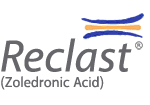
Reclast (zoledronic acid) is a bisphosphonate class of drug and is used to treat osteoporosis in women and to increase bone mass in men. It also is used to prevent new fractures in patients with a recent low-trauma hip fracture.
WHAT TO EXPECT
Reclast is given by IV infusion once a year. Each infusion will take about 20 minutes.
| Website |
| Prescribing Information |
Remicade (infliximab)

Remicade is used to treat certain types of arthritis (Rheumatoid Arthritis (RA) and psoriatic arthritis), certain bowel diseases (Crohn’s disease and Ulcerative colitis), as well as plaque psoriasis and ankylosing spondylitis (an inflammatory disease of the bones in the spine).
With these inflammatory conditions, your immune system becomes overactive and produces excess amounts of protein called TNF-alpha (tumor necrosing factor alpha), which causes your immune system to attack healthy cells. Remicade blocks the TNF-alpha, preventing inflammation.
Remicade biosimilars are also available, including Avsola (Amgen), inflectra (Pfizer), and renflexis (Merck), which are often prescribed instead of Remicade.
WHAT TO EXPECT
Remicade is administered by IV infusion every 8 weeks (or every 6 weeks for ankylosing spondylitis) after an induction regimen of 3 doses over 6 weeks. Each infusion takes about 2 hours.
You may be prescribed premedication such as antihistamine, acetaminophen, and/or corticosteroid with your Remicade (or biosimilar) infusion.
| Website |
| Prescribing Information |
| Patient Support |
Renflexis (infliximab-abda)

Renflexis (infliximab-abda) is used to treat certain types of arthritis (Rheumatoid Arthritis (RA) and psoriatic arthritis), certain bowel diseases (Crohn's disease and Ulcerative Colitis (UC)), as well as plaque psoriasis and ankylosing spondylitis (an inflammatory disease that, over time, can cause some of the bones in the spine to fuse).
In these inflammatory conditions, your immune system becomes overactive and produces excess amounts of a protein called TNF-alpha (tumor necrosis factor alpha), which causes your immune system to attack healthy cells. Renflexis blocks the action of TNF-alpha, preventing inflammation.
Renflexis is biosimilar to Remicade (Jannsen), the original formulation of infliximab. Other Remicade biosimilars include Avsola (Amgen) and Inflectra (Pfizer).
WHAT TO EXPECT
Renflexis is administered by intravenous infusion every eight weeks (every 6 weeks for ankylosing spondylitis) after an induction regimen that includes three doses over six weeks. Each infusion takes about two hours.
Your doctor may prescribe premedication with antihistamine, acetaminophen, and/or corticosteroid along with your Renflexis infusion.
| Website |
| Prescribing Information |
| Patient Support |
Rituxan (rituximab)

Rituxan (rituximab) is a monoclonal antibody that helps the body's immune system by targeting and destroying certain cells, thereby helping to protect healthy cells from damage. Specifically, it is a CD20-directed cytolytic antibody used for a variety of lymphomas leukemias and inflammatory conditions. Although Rituxan may be used to treat cancer it is not chemotherapy.
Other biosimilar brands of rituximab include Ruxience (rituximab-pvvr) and Truxima (rituximab-abbs).
WHAT TO EXPECT
Rituxan is given as an IV infusion. Frequency and time of infusion varies based on the condition being treated.
| Website |
| Prescribing Information |
| Patient Support |
Rocephin (ceftriaxone sodium)

Rocephin (ceftriaxone sodium) is an antibiotic used to treat many kinds of bacterial infections including severe or life-threatening forms such as meningitis. Rocephin is also used to prevent infection in people having certain types of surgery.
WHAT TO EXPECT
Rocephin is given via IV infusion, daily, and can vary from 2-4 weeks or longer. Each infusion takes about 20 minutes.
| Website |
| Prescribing Information |
Ruxience (rituximab)

Ruxience (rituximab) is a monoclonal antibody that helps the body's immune system by targeting and destroying certain cells, thereby helping to protect healthy cells from damage. Specifically, it is a CD20-directed cytolytic antibody used for a variety of lymphomas leukemias and inflammatory conditions. Although Ruxience may be used to treat cancer it is not chemotherapy.
WHAT TO EXPECT
Ruxience is given by IV infusion. Frequency and length of infusion varies depending on the condition being treated.
| Website |
| Prescribing Information |
| Patient Support |
Simponi Aria (golimumab)

Simponi Aria (golimumab) is a monoclonal antibody that helps the body's immune system by targeting and destroying certain cells, helping to protect healthy cells from damage. Specifically it is a tumor necrosis factor (TNF) blocker and used to treat Rheumatoid Arthritis (RA), psoriatic arthritis, and ankylosing spondylitis.
WHAT TO EXPECT
Simponi Aria is given by subcutaneous (under the skin) injection every 8 weeks. Each appointment will take approximately 30 minutes.
| Website |
| Prescribing Information |
| Patient Support |
Soliris (eculizumab)
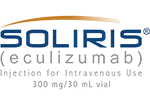
Soliris (eculizumab) is a monoclonal antibody that binds to proteins in the blood that can destroy red blood cells. Specifically it is a complement inhibitor antibody used to treat myasthenia gravis and certain hemolytic (blood-related) syndromes.
WHAT TO EXPECT
Soliris is given by IV infusion every other week. Each appointment will take about 45 minutes.
| Website |
| Prescribing Information |
| Patient Support |
Solu-Medrol (methylprednisolone 21)

Solu-Medrol (methylprednisolone 21) is a steroid often used for flare-up in patients with Multiple Sclerosis (MS) or infused with other medications to treat MS. Solu-Medrol works by preventing the release of certain substances in the body that can cause inflammation.
WHAT TO EXPECT
Solu-Medrol is given via IV infusion. Frequency varies depending on the condition being treated and each appointment will take about 1 hour.
Stelara (ustekinumab)

Stelara (ustekinumab) is an immunosuppressant that reduces the effects of a chemical substance in the body that can cause inflammation. Specifically it is an interleukin-12 and -23 antagonist antibody, used to treat psoriasis Crohn’s disease and Ulcerative Colitis (UC).
WHAT TO EXPECT
Stelara is given via subcutaneous injection or IV infusion (depending on diagnosis). For psoriasis, Stelara is given every 12 weeks (after two starter doses); For UC and Crohn’s disease, every 8 weeks (after an IV starter dose).
| Website |
| Prescribing Information |
| Patient Support |
Tepezza (teprotumumab-trbw)

Tepezza (teprotumumab-trbw) is an insulin-like growth factor-1 receptor inhibitor used to treat Thyroid Eye Disease, an autoimmune disease characterized by proptosis (a condition where the eyes are pushed forward and bulge outward) leading to eye pain double vision and difficulty closing the eyelid.
WHAT TO EXPECT
Tepezza is given via IV infusion once every 3 weeks for 8 doses. Each infusion will take about 90 minutes.
| Website |
| Prescribing Information |
| Patient Support |
Thyrogen (thyrotopin alpha)

Thyrogen (thyrotopin alpha) is a replacement for thyroid stimulating hormone (TSH) used as a diagnostic tool for thyroid cancer and adjunctive ablative treatment (a type of minimally invasive procedure used to remove thyroid tissue that was not removed with surgery) in people with thyroid cancer.
WHAT TO EXPECT
Thyrogen is given via IM (into the muscle) injection in 2 doses 24 hours apart. Each injection will take 10 minutes or less.
| Website |
| Prescribing Information |
| Patient Support |
Truxima (rituximab)

Truxima (rituximab) is a monoclonal antibody that helps the body's immune system by targeting and destroying certain cells, thereby helping to protect healthy cells from damage. Specifically, it is a CD20-directed cytolytic antibody used for a variety of lymphomas leukemias and inflammatory conditions. Although Truxima may be used to treat cancer it is not chemotherapy.
WHAT TO EXPECT
Truxima is given via IV infusion. Frequency and length of infusion varies depending on the condition being treated.
| Website |
| Prescribing Information |
| Patient Support |
Tysabri (natalizumab)

Tysabri (natalizumab) is used to treat relapsing and secondary progressive forms of multiple sclerosis (MS). It is also prescribed to treat moderately to severely active Crohn's disease in patients for whom other treatments haven't worked.
Tysabri is a monoclonal antibody. Monoclonal antibodies are made to target and destroy only certain cells in the body. This may help to protect other, healthy cells from damage.
In rare cases, Tysabri can cause a serious brain infection called PML that can lead to disability or death. In 2005, this led the manufacturer to take Tysabri off the market. Tysabri was reintroduced after the manufacturer developed a program to register patients and follow up regularly to find any possible cases of PML as soon as possible.
CCR MEDICAL strictly observes these protocols, called the "Tysabri Touch" program.
WHAT TO EXPECT
Tysabri is administered by intravenous infusion every four weeks. Each infusion takes about an hour.
| Website |
| Prescribing Information |
| Patient Support |
Ultomiris (ravulizumab-cwvz)

Ultomiris (ravulizumab-cwvz) is a monoclonal antibody that helps the body's immune system by targeting and destroying certain cells, helping to protect healthy cells from damage.
Ultomiris is used to treat adults with a disease called Paroxysmal Nocturnal Hemoglobinuria (PNH), a rare genetic disorder in which defective red blood cells break down prematurely and leak hemoglobin into the blood. Ultomiris is also used to treat adults and children 1 month of age and older with a disease called atypical Hemolytic Uremic Syndrome (aHUS).
WHAT TO EXPECT
Ultomiris is given by IV infusion every 8 weeks, starting 2 weeks after an initial loading dose. Each infusion will take about 2 hours.
| Website |
| Prescribing Information |
| Patient Support |
Uplizna (inebilizumab-cdon)

Uplizna (inebilizumab-cdon) is a monoclonal antibody for the treatment of some adult patients with neuromyelitis optica spectrum disorder (NMOSD). NMOSD is a rare, severe, neuroinflammatory autoimmune disease that attacks the optic nerve, spinal cord, and brain stem. In addition to potentially irreversible blindness and paralysis, patients may also experience loss of sensation, bladder and bowel dysfunction, nerve pain and respiratory failure.
B cells are important cells in the body’s immune system but are also thought to be a potential cause of autoimmune diseases like NMOSD. Uplizna is believed to work by lowering the levels of B cells in the body, which may reduce the overactive immune response found in individuals with NMOSD.
WHAT TO EXPECT
Uplinza is given by IV infusion every 6 months after an initial course of 2 infusions, 2 weeks apart. Each infusion takes 90 minuyes followed by a 60 minute monitoring period.
| Website |
| Prescribing Information |
| Patient Support |
Vancomycin (vancomycin hydrochloride)

Vancomycin (vancomycin hydrochloride) is an antibiotic used to treat certain bacterial infections.
WHAT TO EXPECT
Vancomycin is given via IV infusion, usually daily over 4-6 weeks. Each infusion will take 60-90 minutes.
| Website |
| Prescribing Information |
Venofer (iron sucrose)
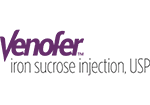
Venofer (iron sucrose) is an iron replacement for the treatment of iron deficiency anemia.
WHAT TO EXPECT
Venofer is given via IV infusion. Frequency varies. Each appointment will take about 1 hour.
| Website |
| Prescribing Information |
| Patient Support |
Vibativ (telavancin)

Vibativ (telavancin) is an antibiotic used to treat skin infections and pneumonia that can be contracted in a hospital setting or while using a ventilator.
WHAT TO EXPECT
Vibativ is given via IV infusion daily for up to 21 days. Each appointment will take about 1 hour.
| Website |
| Prescribing Information |
Vyepti (eptinezumab-jjmr)

Vyepti (eptinezumab-jjmr) is a calcitonin-gene related peptide antagonist (CGRP) inhibitor that is used to prevent migraines in adults. Vyepti (pronounced VEE ep tee) was approved for use by the Food and Drug administration (FDA) in February 2020 and became available in April.
WHAT TO EXPECT
Vyepti is given via IV infusion every 3 months. Each infusion will take approximately 30 minutes.
| Website |
| Prescribing Information |
| Patient Support |
Xolair (omalizumab)

Xolair (omalizumab) is a monoclonal antibody that helps decrease allergic responses in the body. Specifically, it is an anti-IgE antibody used for asthma and chronic idiopathic urticaria (hives).
WHAT TO EXPECT
Xolair is given via subcutaneous (under the skin) injection every 2-4 weeks. Each appointment will take 10 minutes.
| Website |
| Prescribing Information |
| Patient Support |
Zemaira (alpha 1-antitrypsin inhibitor)

Zemaira (alpha 1-antitrypsin inhibitor) is a peptide isolated from donor plasma and purified. It is used to treat adults with lung disease (emphysema) caused by severe Alpha1 Antitrypsin (AAT) deficiency.
The Alpha1 protein circulates in the bloodstream and works to protect the lungs from inflammation due to infection or inhaled irritants, such as tobacco smoke. Alpha1 deficiency is an inherited disorder in which a genetic mutation impacts the body’s ability to produce sufficient levels of the Alpha1 protein.
Aralast NP, Glassia, and Prolastin-C are related medicines with minor chemical differences associated with the purification method.
WHAT TO EXPECT
Zemaira is given weekly by intravenous infusion. Each infusion takes 15 to 30 minutes.
| Website |
| Prescribing Information |
Zinplava (bezlotoxumab)

Zinplava (bezlotoxumab) is a monoclonal antibody that binds to a specific toxin produced by the clostridium difficile (known commonly as “C. Diff”) bacteria to help neutralize the toxin’s effects. Zinplava is not an antibiotic, but it is used in conjunction with an antibiotic to treat life-threatening diarrhea.
WHAT TO EXPECT
Zinplava is given via IV infusion for one dose. Your appointment will take one hour.
| Prescribing Information |
